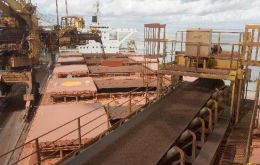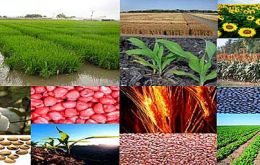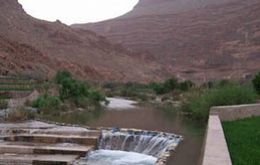MercoPress. South Atlantic News Agency
Stories for 2010
-
Wednesday, March 31st 2010 - 02:14 UTC
Main traders agree on quarterly contracts for iron ore, but no mention of China

Two of the world's biggest mining companies have agreed landmark deals with Asian steel mills to buy iron ore on quarterly contracts. The deals could mark the end of annual contracts that have formed the basis for pricing in the steel industry for decades.
Vale and BHP Billiton said the new system was fairer and more transparent. -
Wednesday, March 31st 2010 - 02:10 UTC
Argentina expects a 2009/2010 crop of 91 million tons, up 48%

Argentina’s 2009/2010 crop is estimated in 91 million tons, 48% higher than the previous mainly because of improved yields thanks basically to more regular rainfall, courtesy of the El Niño climate phenomenon.
-
Wednesday, March 31st 2010 - 02:08 UTC
US criticizes Canada over its Arctic policy

Hillary Clinton has criticised Canada for failing to invite indigenous groups and Scandinavian countries to talks on the future of the Arctic.
-
Wednesday, March 31st 2010 - 02:04 UTC
UK economy recovery in fourth quarter revised upwards

The United Kingdom economy grew faster than previously thought in the last quarter of 2009, the Office for National Statistics says. It revised October to December's growth to 0.4%, up from the previous estimate of 0.3%.
-
Tuesday, March 30th 2010 - 23:00 UTC
Quake impact leaves Chilean farmers short of storage, cooling and irrigation

Chile’s annual fall harvest season continues apace, notwithstanding earthquake damage to Chile's roads, irrigation systems, electric grid, packing houses, and other infrastructure.
-
Tuesday, March 30th 2010 - 22:48 UTC
Senator McCain calls for troops to be deployed along Mexican border

The influential US Senator John McCain from Arizona sent a letter to Homeland Security Secretary Janet Napolitano calling for the deployment of National Guard troops along the “southern border region” between the US and Mexico to help counter the growing violence from the drug cartels.
-
Tuesday, March 30th 2010 - 22:42 UTC
Mrs. Kirchner vows to lead “profound, cultural, diplomatic battle” to regain Malvinas

Argentine President Cristina Fernández de Kirchner at the opening Tuesday of a photographic exhibition honouring the Malvinas women vowed before to lead “a profound, cultural, diplomatic and political battle on every front,” and to make use of “every resource made available by international law to regain the Malvinas Islands sovereignty.”
-
Tuesday, March 30th 2010 - 04:48 UTC
Chavez announces the discovery of a “super well” of natural gas

Venezuelan President Hugo Chavez announced the discovery of a “super well” that shows an offshore field holds almost twice as much natural gas as originally estimated.
-
Tuesday, March 30th 2010 - 04:46 UTC
Argentine dockworkers strike expands; 5.000 trucks waiting to unload

Argentine dockworkers expanded the strike to eight terminals, mainly in the Greater Rosario port area, the heart of the country’s soy bean belt, demanding higher pay and improved working conditions. The conflict comes when Argentina, the world’s third exporter of the oil seed prepares to ship the latest crop.
-
Tuesday, March 30th 2010 - 04:44 UTC
Bolivia’s Morales expects to consolidate provincial power in Sunday’s election

Bolivia is in the last leg ahead of next Sunday’s governor election when president Evo Morales expects his party to keep control over seven of the nine provinces in dispute while the opposition will try to gain lost ground in recent votes.
